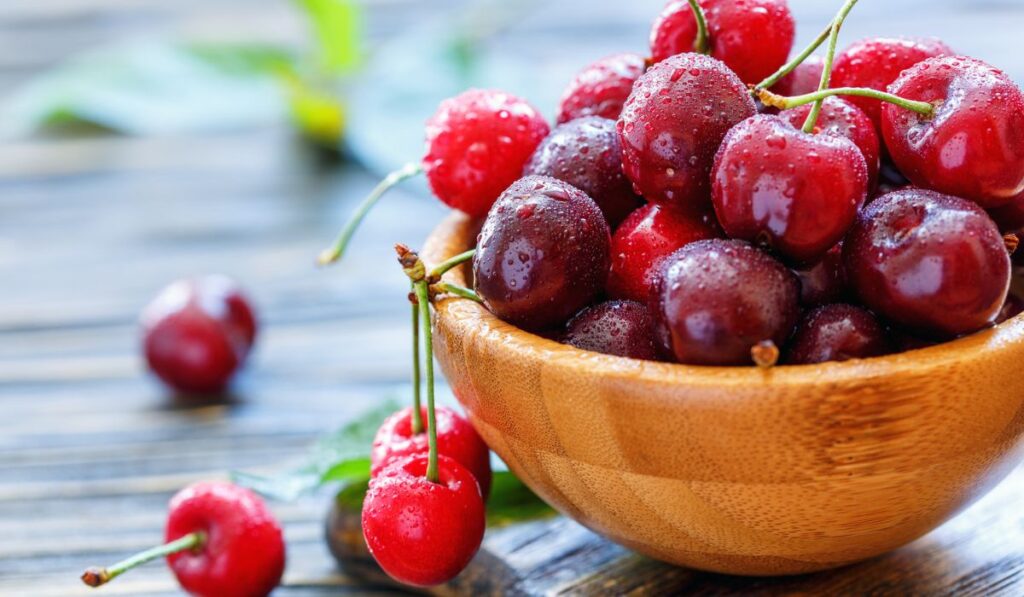Cherries are shiny, juicy fruits grown in many states in the US. These fruits have been cultivated for ages and have become a treat some Americans can’t do without. So, when can you buy this delicious fruit in the US?
Cherry season usually falls between May and August and fresh cherries key ingredient in popular American summer dishes like cherry cobbler. The cherry is a versatile fruit that goes well with many dishes. Consider the color and firmness when shopping for fresh, ripe cherries.
Like most fruits, cherries are perishable, hence the need to store them. Let’s learn more about the cherry season, things to look for when buying cherries, why you need to refrigerate them, and the many benefits cherries have.
Where are Cherries Grown?

Although the Pacific states are the largest cherry growers in the US, cherries are cultivated in other parts of the country. For example, Michigan produces nearly all the sour cherries grown commercially in the United States.
While Red Maraschino Cherries (on Amazon) are available year-round, in jars, these are typically for cocktails. Dried cherries (also on Amazon) are another great off-season option. But hopefully you have the opportunity to get some fresh cherries!
What Time of Year Can You Buy Cherries?
Several factors determine when cherries are available. Some include weather, water intake, sunlight, and tree type. Barring no delays, you can expect to find ripe cherries anytime from early May to August.
Sweet cherries are generally available from May to August. On the other hand, sour/tart cherries have a shorter growing season. They are only available for a week or two, usually during mid-June in warmer regions and late July or early August in colder areas. You can also expect peak cherry season around mid-July.
What to Look for When Buying Cherries?
When picking cherries at the fruit stand, you should look for several things.
- To begin with, only buy cherries with the stems still attached. Cherries with the stem attached stay fresher longer. And ensure the stems are still green before buying them.
- Cherries should be dark or bright red, depending on their variety. For instance, when picking Rainier cherries, the darker the color, the better.
- The cherries you buy should shine and feel firm, with no wrinkles or bruises. Take a close look at the skin of the cherry. Ensure the skin is smooth and doesn’t appear wrinkled. Wrinkled cherry skin may be a sign the fruit is overripe.
However, remember that sour cherries have a softer texture and are more delicate than sweet cherries. Therefore, it would be best if you were gentler when squeezing them.
- We recommend tasting one cherry to give you an idea of how the rest might taste. Having a taste will help you predict if you should buy more of the same or find another variety. You should be able to try the cherries at any grocery store.
- Lastly, before you purchase, look at the color of the cherry itself. The color of a cherry tells you a lot about it. For example, a brownish color is a dead giveaway that the fruit isn’t fresh.
Fun fact: Cherries don’t ripen once harvested. In fact, after harvest, cherries convert their sugars to starch. This is why freshly picked cherries have a much better taste.
Are Cherries Good for You?

These plump fruits are packed with nutrients that are great for your health. Let’s look at five reasons why cherries are good for you.
1. Cherries are Packed with Antioxidants
The high antioxidant content in cherries helps fight against chronic diseases and prevent early aging. In addition, cherries are exceptionally high in polyphenols, plant chemicals that reduce inflammation, combat cellular damage and promote overall health.
Furthermore, diets rich in polyphenol help protect against serious diseases, such as diabetes, heart disease, and cognitive decline.
These plump fruits also have carotenoid pigments like vitamin C and beta-carotene, which have antioxidant properties.
2. Cherries Contain Several Nutrients
Cherries are very nutritious and are high in minerals, vitamins, and fiber. For example, vitamin C is necessary for helping the body repair and fight diseases. On the other hand, cherries contain potassium.
Potassium is required for regulating blood pressure, enhancing nerve function, and so on. Additionally, potassium is vital for the heart’s health, as it helps maintain a regular heartbeat and assist in removing excess sodium from the body, which regulates blood pressure.
3. Cherries Help with Arthritis Symptoms
Cherries ease symptoms of arthritis because they suppress the inflammatory proteins that cause pain in the joints. They can also help lower uric acid levels in the body, which must be soothing news for people with gout.
4. Cherries Improve Exercise Recovery
According to research, the anti-inflammatory properties of cherries may relieve muscle pain, inflammation, and damage from intense workouts. In addition, sour cherries appear to give better results than sweet cherries. However, both varieties will still do the job.
5. Cherries Help Maintain Brain Health
Cherries contain anthocyanins which have been linked to improving brain health. In one survey, drinking cherry juice daily for three months improved memory and verbal fluency in older people with mild to moderate dementia. We’re not implying that cherries are a cure for dementia, but they can help.
6. Cherries Enhance Sleep Quality
Consuming cherries help you sleep better. They also contain melatonin, a compound that assists in regulating your sleeping cycle.
A study found that people who drank sour cherry juice for a week had higher melatonin levels and slept better for longer. Another survey of older people with insomnia found that drinking one cup of cherry juice before bedtime lengthened sleep by over an hour.
7. Cherries Help with Weight Loss
If you want to lose weight, remember to include cherries in your diet. These juicy fruits contain low calories, so you can enjoy cherries without getting nervous.
For context, a cup of cherries contains under 100 calories. Furthermore, they are high in vitamins that help metabolism and contain adequate water content that helps your body flush out toxins.
Do Cherries Need to be Refrigerated?
Yes, cherries need to be refrigerated for preservation. But the process is easy and doesn’t take too much time. To refrigerate cherries:
- Once home, take the cherries out of the bag and place them in a container.
- Make sure you remove any bruised cherries, either discarding them or transforming them into jam or juice.
- Afterward, place the container in the refrigerator.
Keeping cherries in the refrigerator is important because heat makes them spoil quicker. Another thing you should not do is rinse them until just before eating, as water hastens spoilage.
Cherries are very perishable and do not ripen after being picked. Therefore, you should only leave them out on the counter if you plan on eating them on the same day.
How to Preserve Cherries
However, note that even if you keep the cherries chilled, they will not last long. You’ll need to use them within three or four days. So for longer preservation:
- First, remove the stems from the cherries and pit them.
- Afterward, refrigerate the cherries on a baking sheet for five hours.
- After that, transfer the frozen cherries into an airtight bag or jar.
The importance of freezing on a tray first is that it prevents them from getting clumped up together. You can easily remove the cherries when needed and return them when you follow this method.
